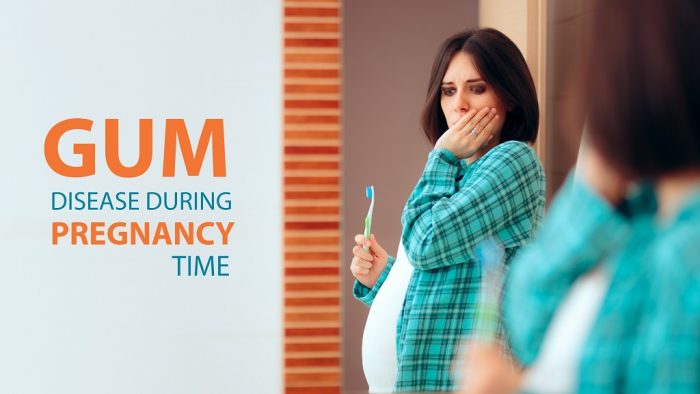Gum Disease During Pregnancy Time
June 28, 2021
Pregnancy is one of the most blissful experiences that a woman can have. But, while you may be excited to welcome your child, pregnancy can also affect your physical and mental health. And, one of the most common issues that pregnant women face is periodontal disease or oral health issues.
Many healthcare experts worldwide have corroborated that the hormonal changes during pregnancy can affect a woman’s oral health. Let us understand more about how pregnancy and gum diseases are linked, and what you can do to ensure that you and the unborn child remain healthy during this time.
What is gum disease?
Gum disease or periodontal disease affects the soft tissues that hold the teeth together intact. If you are diagnosed with gum disease, these soft tissues are damaged because of the harmful bacteria present in the mouth. Whether the disease can be cured and the damage be reversed, mainly depends on how far the disease has progressed.
According to the American Academy of Periodontology (AAP), mild gum diseases such as Gingivitis are reversible, and it can be easily cured with proper oral care and medications. Gingivitis is a condition wherein the gums become irritated, and it is usually caused by inadequate oral hygiene. Some common symptoms include – swollen gums, mild bleeding of the gums, or the gums becoming red.
The more severe form of gum disease is known as periodontitis. It mainly occurs when Gingivitis is left untreated. Consequently, the gum and the bone that hold the teeth get damaged beyond repair. This can lead to complete tooth loss.
Gum disease and pregnancy
Gum diseases during pregnancy usually occur due to plaque accumulation, which can increase because of the pregnancy-related hormonal changes in the body. Also, the changes in the oral microbiome may contribute to the development of gum disease.
Some of the common signs that indicate gum disease among pregnant women –
- Gum bleeding
- Formation of pockets between gums and the teeth
- Foul breath
If you notice any of these signs during pregnancy, it is vital that you immediately consult a dentist and get a thorough evaluation.
Effects of gum disease on pregnancy
Many healthcare experts suggest that gum disease during pregnancy can increase the risk of adverse pregnancy outcomes. Such outcomes include
- Low-birth weight of the child
- Restriction in baby’s growth
- Preterm labour
Prevention of gum disease
According to the American Academy of Periodontology, pregnant women must maintain healthy gums. AAP also outlines a few measures that women must take to maintain optimal oral health before, during and after pregnancy.
Before pregnancy
If you are ready for pregnancy, it is advised to book an appointment with your dentist for a complete check-up. This way, you can be sure that your teeth are professionally cleaned and the gums are examined carefully. And, if there are any underlying issues, it can be treated immediately so that it does not have an adverse effect on pregnancy.
During pregnancy
Inform your dentist about pregnancy. And, if you are visiting for routine care, it is advisable to check with your gynaecologist to see if they have special precautionary instructions for you.
Make sure to tell your dentists about the medication you are taking and the dosage prescribed by your gynaecologist, before taking any drugs for oral health issues. Based on your health condition, the dentist may alter your dental treatment plan and change the medication.
Generally, X-rays are not advised for pregnant women. But, a dental X-ray can be done during pregnancy. The dentist will exercise extreme caution to safeguard you and your baby. The technological advancement in the medical field has made X-rays much safer than before.
Never skip your dental check-up appointment because of pregnancy. You may need utmost care now, more than before. Regular examination is vital, because hormonal changes can put you at a higher risk of developing gum diseases.
Follow good oral practice in general at home. Remember to brush at least twice a day, floss once a day, and use a good mouthwash to rinse out the germs. If you notice something unusual in your teeth or gums, immediately visit the dentist for a check-up.
After pregnancy
If you have had any gum disease during pregnancy, make sure to visit the dentist soon after delivery, for a complete oral health check-up. Always maintain oral care as mentioned above.
Final Word
Now that you understand the importance of oral care during pregnancy, take utmost care of your oral health, to reduce the risk of adverse effects on pregnancy and the baby.


















































